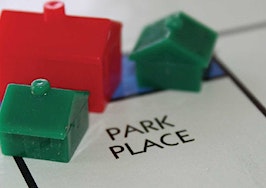- According to NAR's latest annual Profile of Homebuyers and Sellers, single women are scooping up property more often than their male counterparts.
- For this group, developing savings and facing dual-income couples in bidding wars are some of the biggest challenges.
- BHGRE president Sherry Chris recommends that this demographic select agents well-versed in the local market and well-connected in the agent community.
Selma Hepp is on the hunt for that rare thing: a small affordable house in the hot south Los Angeles market.
As Pacific Union International’s chief economist and vice president of business intelligence, Hepp is no slouch in knowing her financial options. And although she isn’t shopping alone, she’s also not part of the more traditional crowd who takes the plunge after tying the knot.

Selma Hepp
Rather, the real estate-savvy exec (whose parents joined her from Croatia a few years ago) is part of a growing surge of single women looking to become homeowners.
According to the National Association of Realtors’ (NAR) annual Profile of Home Buyers and Sellers released this week, in 2016, single women were responsible for 17 percent of total home purchases, an uptick from 15 percent last year.
Meanwhile, single men made up just 7 percent of home purchases despite edging out single women’s average income, $69,600 to $55,300, respectively.
Hepp’s experience forging through bid battles without the support of dual income — and challenge in finding the right agent — gives insight to what this particular buyer demographic faces to find “the one.”
Now put your hands up (if you want a house)
Given single women’s interest in homeownership, their representation in the housing market is likely to continue building, with job growth holding steady and credit conditions becoming less stringent than in past few years, according to NAR.
It has happened before. In 2006, single women represented 22 percent of total homebuyers.
Moreover, the biggest driver for women to buy is their sheer desire to own. Having children may play a part in this — 21 percent of single female buyers in 2016 had kids, which could explain their desire for the stability a home provides and their unwillingness to compromise on schools.
The average age of this segment, according to NAR’s research, is 50. In many cases, these individuals are coming out of marriages or are widowed, said Jessica Lautz, managing director, survey research and communications at NAR.
Within the group, the average age of the single woman buying her very first home in 2016 is 34 (compared to 31 in the case of single men). Meanwhile, the average age of the repeat single female buyer is 57.
The biggest competition? Dual income
Hepp, a Gen Xer in her late 30s, began looking to buy in 2013 but was continually outbid.
“I was well-educated, had a great income, but unfortunately I did have not enough of a down payment, which made my bids uncompetitive in that situation,” she said.
She took some time out of the market and re-entered six months ago, this time having to raise her price to the $700,000 range, but with a better down payment.
Hepp sees couples as her biggest competition when bidding for homes. NAR’s profile, which reported that married couples made up the largest homebuyer share (66 percent) and with the highest income ($99,200), supports her sentiment.
The active homebuyer is finding it hard not to be discouraged in her hot market.
“The unfortunate thing is, again, I find myself outbid many times by people — it seems simply impossible to buy with a single income,” she said.
A lot of couples are gifted or loaned money from parents, something that is not an option for Hepp, though she does have one unique advantage: Her father, who had a construction company in Croatia, can perform renovations. That opens up the door to a fixer-upper.
According to Lautz at NAR, when it comes to buyers, females seem more willing to make sacrifices than single males by cutting down on non-essentials, such as entertainment and clothes, and trimming finances to make homeownership possible.
The economist in Hepp keeps some of the homebuying emotion at bay; she has a solid savings deposit in the bank, and she’s realistic about where it can take her. “It’s very important that I don’t overstretch myself — but I am prepared to make sacrifices,” she said.
Advice from the pros
Better Homes and Gardens Real Estate President and CEO Sherry Chris has some advice for single women in the homebuying realm: Choose your agent with care, and don’t let emotion into the equation.
Rather than selecting an agent who might feel like a friend, buyers should find a professional who knows the local market and is also well-connected and liked in the agent community, which can be the tipping point in a multiple offer situation.
“My exact advice to female buyers is to put your armor on and look at the home purchase as a business deal,” Chris added.
Hepp made the decision to change agents since she first started looking. A female agent working for a Pacific Union affiliate now helps her, though she started with a male agent with another brokerage.
She hadn’t given any thought to whether a male or female agent would be better, but she is happier with her current adviser.
“The agent I ended up with, she has an understanding of my personal life, of my parents’ needs and what we are looking for. She has a very sensitive understanding of what would work for our situation,” Hepp said.
Something to be proud of
Chris, who remembers buying her first home at the age of 23, recalls the feeling it gave her:
“I had such an amazing sense of pride as a young woman in buying my first home. Having my parents over, I just had an incredible feeling to be able to do that. There’s a piece of the female psyche that we want to have that comfort zone of a home that we own.”
Why are single women more interested in homeownership than their male counterparts?
“If single women immerse themselves in a career, and are not planning a family in the near term, they want to make a home for themselves and a life for themselves,” Chris said.
Men, she suggests, feel less compelled to make a home for themselves if they are not involved in a relationship.
Chris also sees single women wanting to buy a home their family can visit even after their children are grown, citing her successful next-door neighbor who bought a three-bedroom Manhattan condo — in case her two adult daughters might want to come back.
As author Rebecca Traister’s discusses in her recently published book, All the Single Ladies, residential development in major cities has, to a certain extent, been designed around the needs of single women, with a number of apartment buildings in New York being built for this demographic in the 1950s and beyond.
“I’m guessing that more cities are going to have to adapt to that to make them comfortable places for single women,” said Chris.









